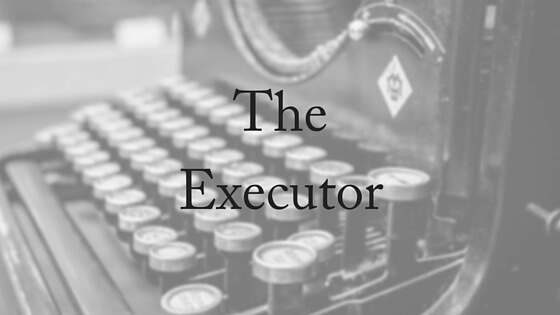
What is an executor of a will? The executor of a will is responsible for carrying out the wishes of a person after they die. The role of the executor is to manage the estate within the terms of the Will and protect the assets of the estate. They are obligated to engage in the due administration of the estate. Choosing an executor carefully and wisely is very important.
Enormous obligations are cast upon the executor of a will to gather in the estate, pay all testamentary debts and expenses and to distribute the estate in a correct and legal way. The duties of an executor can be complex and demanding and require an understanding of the law, tax and accounting requirements. It is not a job for the fainthearted – or the dishonest.
[Tweet “The duties of an executor can be complex and demanding.”]
What does the executor of a will have to do?
It is a serious and time-consuming task to be an executor of a will. The first thing that an executor (or the executors) need to do is to apply for a grant of probate. Probate is the process of managing the estate and assets of a deceased person. A grant of probate is an order of the court that the executor named in the deceased person’s will is entitled to administer the estate. A grant of probate is also the court’s official recognition that the will is valid under the law. A grant of probate is usually required for the executor to go ahead with the administration of the deceased’s estate. Applying for probate can be complicated, so it is better to seek legal help to do so.
After a Grant of Probate is obtained, the executors are bound to gather in the estate. This term means that the assets owned by the deceased person must be placed in the legal name of the estate. For example, a bank account owned by John Smith would be placed in the name of the executor on behalf of the estate of John Smith.
Some of the other duties of an executor of a will may include:
- making funeral arrangements
- locate the Will and notify all of the beneficiaries
- checking and protecting assets – making sure they are insured
- collect any valuables and income
- pay any debts from the estate and consider any liabilities
- prepare and lodge tax returns
- prepare financial statements
- distributing the estate in accordance with the Will
- bringing and defending any legal proceedings on behalf of the estate
Who do I choose to be an executor?
 The role of executor is important, therefore it’s crucial to nominate the right person for the job. In Australian Law you can nominate up to four executors in your Will. There can be advantages to having more than one executor nominated to help fulfill the task, but it’s not always smooth sailing. When two can work together well and share the load it can be excellent, but it is better to have one do it well if you are thinking of naming an extra just to avoid hurt feelings.
The role of executor is important, therefore it’s crucial to nominate the right person for the job. In Australian Law you can nominate up to four executors in your Will. There can be advantages to having more than one executor nominated to help fulfill the task, but it’s not always smooth sailing. When two can work together well and share the load it can be excellent, but it is better to have one do it well if you are thinking of naming an extra just to avoid hurt feelings.
[Tweet “The role of executor is important, therefore it’s crucial to nominate the right person for the job.”]
Many people choose family members or friends for this role. They need to be over 18 years of age, trustworthy, reliable and capable of carrying out their executor duties. Unfortunately, even family can swindle us. Robyn and Graham found that our when their mother Shirley died. Their eldest sister, June, who had been named and was acting as executor, frittered away $75,000 of a much larger estate before she was found out. The younger siblings who had been patiently waiting their share had the court remove her as executor – an expensive and time consuming process. Shirley had chosen June because she was the eldest, not because she was the most capable of doing the job.
If there is likely to be any dispute over your estate when you die, then it would be wise to choose someone who will be able to manage and deal with that conflict. This would include not just their personal and emotional capacity, but also their physical health. Someone who does not have robust health may struggle with a complex and difficult estate administration. You should also avoid anyone with a history of dishonesty, an inability to manage money and an inability to make good decisions.
There are some useful questions you can ask yourself as you consider you might be an executor of your will. Some of those questions may be:
- Who do I trust? Not, who should I be able to trust? Who do I really trust?

- Who will have the capacity to make sensible and rational decisions when I die?
- Who would willingly take on this role and be robust enough to cope with conflict if it arises?
- How old is this person and would they have the maturity to take on the role soon, or are they older and unlikely to survive me?
- Does this person have a history that throws up red flags? Bankruptcy? Criminal allegations?
- Do I trust the family and friends of the possible executor? Might they influence the executor to administer my estate unfaithfully.
- Should I appoint more than one executor? Will they be able to make sensible, joint decisions.
- Should I nominate a professional, rather than someone from my family to be executor? How will that affect them and my estate?
It is much better to talk to the person you are hoping to appoint as executor to check that they are amenable to take on such a demanding and time consuming role. If there is no family member of friend that is suitable to be an executor then you can appoint a professional such as a lawyer or accountant to take on the role. You may also choose this particular way if there is a good likelihood of a dispute after you die – family and friend relationships may be less strained if there is someone acting as executor from outside of those relationships.
If your appointed executor decides that when the time comes that they cannot or do not wish to carry out the role then you won’t be left ‘executor-less’. In Queensland, the court will appoint the Public Trustee of Queensland (and other Australian states have similar actions) or someone from your family may apply to the court for ‘letters of administration’.
If you have been appointed as an executor and would like some advice then we would love to help. If you are still considering who to nominate as your executor and finalise your will then we can help you to think through those issues carefully. We offer a free, 10-minute phone consultation with one of our experienced estate lawyers. Please contact us today!

